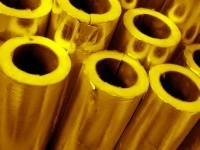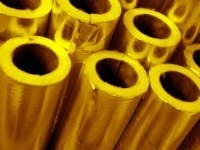Furnace ducts need full-service cleaning
Atnaujinta: 2020-12-09
By Bill & Kevin Burnett
Inman News
 Q: I have an old house (built in 1927) that has the original, old-fashioned, cold-air gravity furnace. It works very well, but there is a lot of dust and I wonder if it comes from the old ductwork. I would like to have these ducts cleaned but I don't know if there could be asbestos that could be loosened up by the cleaning. What do you recommend? We changed the filters but maybe I should just get the big air intake cleaned.
Q: I have an old house (built in 1927) that has the original, old-fashioned, cold-air gravity furnace. It works very well, but there is a lot of dust and I wonder if it comes from the old ductwork. I would like to have these ducts cleaned but I don't know if there could be asbestos that could be loosened up by the cleaning. What do you recommend? We changed the filters but maybe I should just get the big air intake cleaned.
A: We don't wonder that your 1927 furnace spits out a fair amount of dust. Over the 80 years your furnace has been working, many pounds of debris have recirculated throughout your home.
Changing the filters in a heating system is part of regular maintenance, and we applaud your attention to this detail. But, cleaning and vacuuming ductwork is the last thing on most people's mind when it comes to home maintenance. We're no exception to that.
We'd be surprised if your ducts have ever been cleaned. Stop wondering if you should suck the dust out of them. We recommend that you do it, and there is no time like the present.
In our opinion, you shouldn't worry too much about asbestos. Although at least until the 1960s asbestos was commonly used to insulate heating ducts, it was applied to the outside of the ducts, not the inside.
Heating ducts were covered with a cardboard-like material containing asbestos fibers to reinforce them and hold in the heat. Unless the ductwork has been penetrated and the wrapping is shredded, releasing particles into the airflow in the system, asbestos contamination is not an issue. So long as that covering is intact, it's safe.
You can do a little investigation yourself to see if the duct wrapping might contain asbestos. Go into the basement or in the crawl space and take a look at the ducts. If they are wrapped very tightly with what looks like white muslin, there's a good chance the wrap contains asbestos.
That's not at all bad, though. Asbestos is only dangerous when it is friable -- that is, particles that float in the air are potentially ingested. If it encapsulated, it's safe. Asbestos-impregnated material on the outer duct surfaces has not been exposed to the air stream flowing on the inside of the ducts and is unlikely to have penetrated the duct walls and entered your home. If the wrapping is in good shape, you're probably OK.
To make doubly sure and to put your mind at ease, have an environmental testing firm gather filtered air samples from your home for testing by an EPA-approved laboratory. This will remove any uncertainties regarding possible contamination and will provide some welcome reassurance if the lab test is negative.
When searching for a company to clean your ductwork, don't necessarily go for the cheapest game in town. Ask questions from prospective tradesmen about exactly what they are going to do, how long it will take them to do it and what type of equipment they are going to use. Also, voice your concerns about asbestos to them.
Look for someone who will do a thorough, full-service cleaning: vacuuming each duct and cleaning out each register.
A more extensive process uses a larger suction cleaning system and thoroughly cleans out each duct and register. Expect to pay several hundred dollars for this. The good news is that the cleaning should last up to 10 years.
Finally, give your gas and electric utility company a call and ask for someone to come out and inspect your furnace. The old beast has been in service a long time and you want to make sure it's still effective and safe. It's a good insurance policy. And it's free.
***
Copyright 2007 Bill and Kevin Burnett
Changing the filters in a heating system is part of regular maintenance, and we applaud your attention to this detail. But, cleaning and vacuuming ductwork is the last thing on most people's mind when it comes to home maintenance. We're no exception to that.
We'd be surprised if your ducts have ever been cleaned. Stop wondering if you should suck the dust out of them. We recommend that you do it, and there is no time like the present.
In our opinion, you shouldn't worry too much about asbestos. Although at least until the 1960s asbestos was commonly used to insulate heating ducts, it was applied to the outside of the ducts, not the inside.
Heating ducts were covered with a cardboard-like material containing asbestos fibers to reinforce them and hold in the heat. Unless the ductwork has been penetrated and the wrapping is shredded, releasing particles into the airflow in the system, asbestos contamination is not an issue. So long as that covering is intact, it's safe.
You can do a little investigation yourself to see if the duct wrapping might contain asbestos. Go into the basement or in the crawl space and take a look at the ducts. If they are wrapped very tightly with what looks like white muslin, there's a good chance the wrap contains asbestos.
That's not at all bad, though. Asbestos is only dangerous when it is friable -- that is, particles that float in the air are potentially ingested. If it encapsulated, it's safe. Asbestos-impregnated material on the outer duct surfaces has not been exposed to the air stream flowing on the inside of the ducts and is unlikely to have penetrated the duct walls and entered your home. If the wrapping is in good shape, you're probably OK.
To make doubly sure and to put your mind at ease, have an environmental testing firm gather filtered air samples from your home for testing by an EPA-approved laboratory. This will remove any uncertainties regarding possible contamination and will provide some welcome reassurance if the lab test is negative.
When searching for a company to clean your ductwork, don't necessarily go for the cheapest game in town. Ask questions from prospective tradesmen about exactly what they are going to do, how long it will take them to do it and what type of equipment they are going to use. Also, voice your concerns about asbestos to them.
Look for someone who will do a thorough, full-service cleaning: vacuuming each duct and cleaning out each register.
A more extensive process uses a larger suction cleaning system and thoroughly cleans out each duct and register. Expect to pay several hundred dollars for this. The good news is that the cleaning should last up to 10 years.
Finally, give your gas and electric utility company a call and ask for someone to come out and inspect your furnace. The old beast has been in service a long time and you want to make sure it's still effective and safe. It's a good insurance policy. And it's free.
***
Copyright 2007 Bill and Kevin Burnett
To read more similar articles, please, view Heating
Comments (0)

